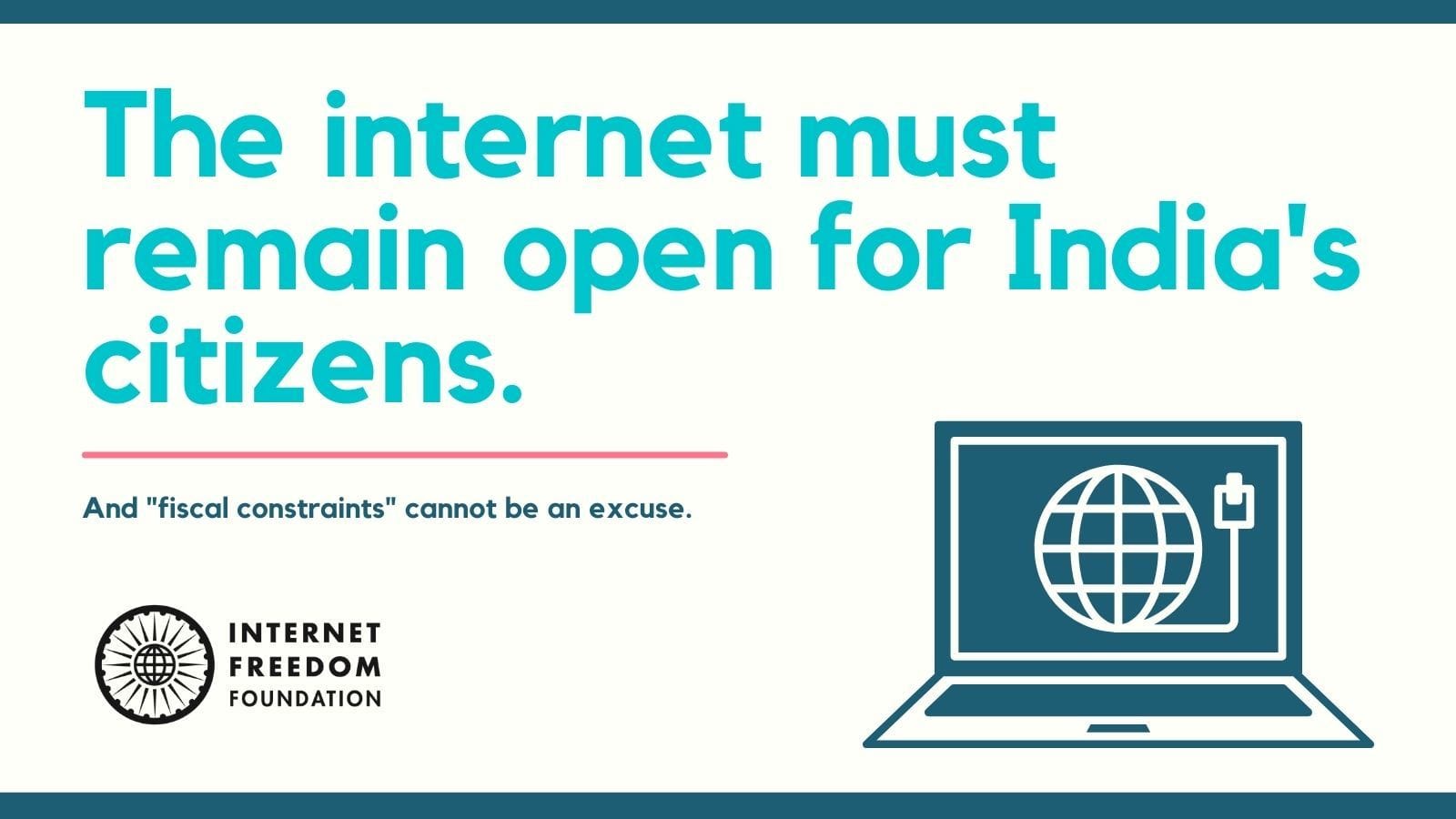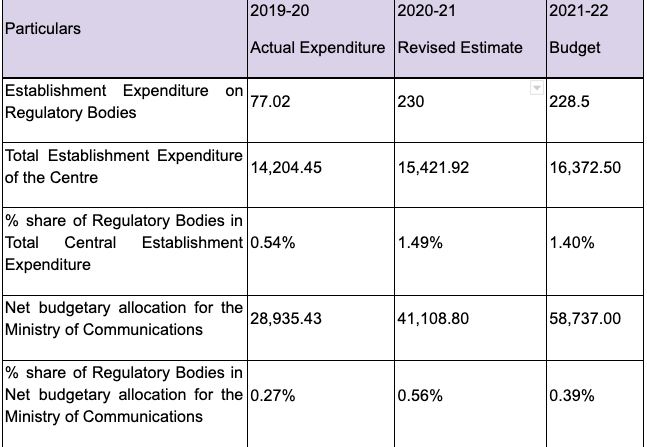
tl;dr
We are committed to net neutrality and were alarmed by a recent report that the Department of Telecommunications (DoT) is citing fiscal constraints in establishing a Multi Stakeholder Body (MSB). The MSB will ensure enforcement of the hard won net neutrality protections for all of us. Today, there is little to no monitoring, complaint or penalty provisions for net neutrality violations and this is concerning given the concentration of telecom service providers in India.
Background
IFF espouses the definition of net neutrality by Prof. Vishal Misra who states that it means, “the Internet be maintained as an open platform, on which network providers treat all content, applications and services equally, without discrimination. This includes ensuring that network providers do not supply any competitive advantage to specific apps/services, either through pricing or Quality of Service”.
In September 2020, the Telecom Regulatory Authority of India (TRAI) had forwarded a set of extremely meaningful recommendations to the Department of Telecommunications (DoT) regarding the enforcement of net neutrality principles by the Internet Service Providers (ISPs) and telecom networks. These recommendations included, the establishment of a Multi Stakeholder Body (MSB) to play an advisory and a regulatory role over the ISPs, overseeing the Traffic Management Practices (TMP) by the ISPs, among other key strategies towards realising the net neutrality principles. However, as per media reports, through a memo dated June 25, 2021, the DoT expressed its disinclination to establish the MSB owing to the Covid-19 driven budget constraints. In its memo to the TRAI, the DoT stated,
“The proposed multi-stakeholder body will require funding from DoT as envisaged in TRAI recommendations. In view of austerity measures being undertaken by the Government due to COVID-19 pandemic, it is prudent to prevent avoidable expenditure.”
To confirm the veracity of such media reports, we had filed a Right to Information (RTI) application with DoT recently. In our RTI application, we had made the following enquiries:
- Actions initiated by DoT with regards to the recommendations provided by TRAI in September, 2020
- Whether any Multi Stakeholder Body was constituted to provide support to DoT in monitoring and enforcing the net neutrality principles.
- The impact caused by Covid-19 budgetary constraints on DoT’s potential to act on TRAI’s recommendations.
The information sought is likely to provide crucial insights into DoT’s progress on executing the recommendations forwarded by TRAI and to gauge any forceable stopgaps in the implementation process. It would also facilitate an understanding of the scale of commercial contribution required by DoT for furthering the net neutrality enforcement mechanisms. However, we are still to receive an answer.
The importance of net neutrality and the multi-stakeholder body
Poised as a world leader in implementing a net neutrality regime, India has adopted a promising approach towards safeguarding the citizens’ rights to access internet services. It however necessitates strong institutional support from relevant government bodies like TRAI and DoT in order to implement the principles of net neutrality. In that regard, TRAI’s recommendations for a functionally independent regulatory framework of the MSB was indeed laudable. The DoT’s hesitancy in implementing the recommendation is likely to heavily impair the efforts of attaining net neutrality all across the country.
In our previous comments, counter comments and supplementary submissions to the TRAI and our representation to DoT on operationalising TRAI’s recommendations, we had highlighted the importance of the MSB. Firstly, managing the list of TMP and updating it continually may require a framework which would have agility and would be able to react fast and evolve with the change in time, technology, services and other factors. This will require an oversight body to avert the possibility of industry capture and discriminatory practices. Secondly, this MSB will enforce standards for technical and operational procedures for monitoring and enforcement of net neutrality. Further, an inclusive MSB with representatives from the civil society,ISPs, telecom networks etc. will effectively raise institutional capacity within the state to reduce net neutrality violations.
Urgent need to enforce net neutrality
IFF’s net neutrality tracker has recorded as many as 62 complaints since the start of 2021. This evinces the recurring incidents of violations of the net neutrality principles. Further, as per TRAI’s Telecom Subscription Data for June 2021, there is a high amount of market concentration among service providers. As of June 30th, 2021, 95.67% of the all-India market share for broadband services is captured by 3 service providers - Reliance Jio Infocomm Ltd (436.69 million), Bharti Airtel (193.74 million), Vodafone Idea (121.41 million). This creates a risk of oligopolistic tendencies and is likely to have a deleterious effect on the implementation of net neutrality, as those players who have captured a high share of the market may not adhere to the values of transparency and accountability.
This is further highlighted by the fact that there are increasing instances wherein licensees continue to discriminate against certain types of internet content and block them with impunity. These instances conform with observations from a larger study published by the Centre for Internet and Society which was published on January 17, 2020. In it, researchers found that the website blocklists of licensed internet service providers (ISPs) across India are widely inconsistent with one another, suggesting that a larger pattern wherein internet providers are either a) not complying with blocking orders or b) arbitrarily blocking websites without legal orders. This undermines the directions of the Supreme Court of India in Anuradha Bhasin v. Union of India and Ors, Writ Petition (Civil) No. 1031 of 2019.
In order to counter such regressive impacts on India’s net neutrality regime, a strong and independent multi stakeholder body is of crucial importance.
Claims of financial constraints may not hold up
The DoT cited fiscal constraints and the need to prevent ‘avoidable expenditure’. Firstly, relegating net neutrality to the status of an avoidable item may be a gross error on the part of the department for the reasons indicated above. Secondly, the latest budgetary figures themselves belie the Department’s claims, as they show that the expenditure on regulatory bodies constitutes a negligible part of the department’s expenditure.

As can be seen in the table above, expenditure on regulatory bodies constitutes a minuscule part of the DoT’s total expenditure (0.39% in the Budget estimates for FY 2021-22). Indeed, even if one were to restrict the scope of analysis to the Establishment Expenditure of the Centre, expenditure on regulatory bodies would constitute only 1.40% of the total Central Establishment Expenditure
Our analysis of the financial hindrances faced by the DoT in acting upon the TRAI’s recommendations, stemming from the budgetary allocations of the DoT reveals that the budget cuts in the allocations of funds for the purposes of establishment of regulatory bodies is negligible. From 0.56% in the fiscal year 2020-2021, it was reduced to 0.39% in 2021-2022. Surely the benefits of having a MSB for enforcing the net neutrality principles outweighs the meagre 0.17% budget deficit that the DoT is experiencing.
In that context, we have reiterated the importance of considering the commendable recommendations of the TRAI by DoT and hope that the Ministry will address our concerns and will do its bit in keeping up the fight to safeguard net neutrality in India.
Our suggestions
The DoT’s Annual Report for 2020-21 noted that one of the goals of the Secure India mission is to, “ensure that net neutrality principles are upheld and aligned with service requirements, bandwidth availability, and network capabilities including next generation access technologies”. It is commendable that the DoT has taken such a firm stance on the upholding of net neutrality. This also makes it all the more important that the DoT not waver from this stance and instead operationalise the TRAI’s recommendations on net neutrality. In light of this, we have the following recommendations for the DoT:
- Operationalise the net neutrality enforcement mechanisms at the earliest, especially by establishing the multistakeholder body as recommended by the TRAI. The recommendations from the TRAI can go a long way in averting the massive damages caused upon the fundamental rights as well as the economic opportunities of the citizens by arbitrary and disproportionate internet shutdowns.
- Approach any major policy rethink on Net Neutrality with transparency and public participation: Here we urged DoT to urgently dispose of our RTI Application and provide us with a copy of the response, along with other relevant documents at the earliest. A lot now remains up to DoT for taking our fight for net neutrality to its logical conclusion and act on the recommendations decisively and assist in public advocacy for vital information.
Important Documents
- IFF’s representation to DoT, dated August 24, 2021 (Link)
- Previous Blogpost on IFF’s representation to TRAI’s public consultation on Net Neutrality enforcement. (Link)
- Previous Blogpost on IFF’s counter comments on TRAI’s public consultation on Net Neutrality enforcement. (Link)
- Previous Blogpost on IFF’s supplementary submission on TRAI’s consultation paper on Net neutrality monitoring and enforcement. (Link)
- Previous Blogpost on IFF’s representation to DoT for operationalising the TRAI’s recommendations (Link)
